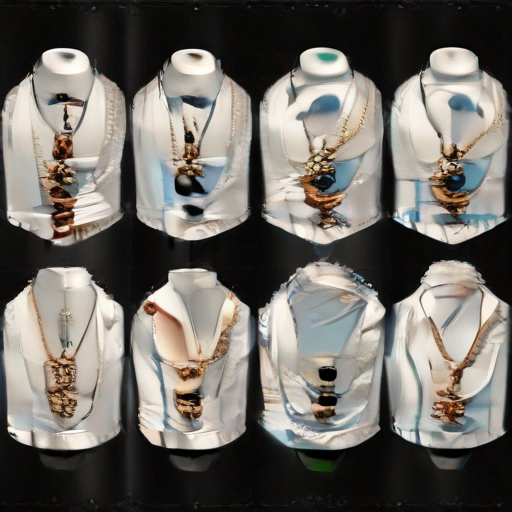
Necklaces That Don't Rust on Jewelry: The Ultimate Guide
When it comes to jewelry, one of the most significant concerns for many people is the risk of rusting. Rusting can cause necklaces to become dull, fragile, and even break apart over time. However, with the wide range of materials available today, there are many options that don't rust on jewelry. In this article, we'll explore the different types of necklaces that won't rust, their advantages, and how to choose the right one for you.
Understanding Rusting
Before diving into the world of necklaces that don't rust, it's essential to understand what causes rusting in the first place. Rusting occurs when a metal reacts with oxygen and moisture, resulting in the formation of iron oxide or rust. This process can happen rapidly if the metal is exposed to humidity, saltwater, or acidic environments.
Types of Necklaces That Don't Rust
There are several types of necklaces that don't rust on jewelry, each with its unique characteristics and benefits. Here are some of the most popular options:
| Material | Description | Advantages |
|---|---|---|
| Sterling Silver | A type of silver alloy that contains 92.5% pure silver and 7.5% other metals | Hypoallergenic, durable, and resistant to corrosion |
| Titanium | A strong and lightweight metal with a natural oxide layer that prevents rusting | Durable, hypoallergenic, and biocompatible |
| Stainless Steel | A type of steel alloy that contains chromium and nickel for added strength and corrosion resistance | Strong, lightweight, and easy to clean |
| Ceramic | A material made from clay and other minerals, often coated with a thin layer of metal or plastic | Hypoallergenic, durable, and resistant to corrosion |
| Crystal | A type of quartz crystal that is clear, colorless, and resistant to corrosion | Hypoallergenic, durable, and adds a touch of elegance |
Sterling Silver Necklaces
Sterling silver necklaces are a popular choice for those who want a high-quality, rust-resistant option. Sterling silver contains 92.5% pure silver and 7.5% other metals like copper or zinc. This alloy provides strength and durability while maintaining the beauty of silver.
Advantages:
- Hypoallergenic: Sterling silver is a good choice for those with sensitive skin.
- Durable: Sterling silver can withstand everyday wear and tear without rusting.
- Resistant to corrosion: The addition of other metals in sterling silver makes it resistant to corrosion.
Titanium Necklaces
Titanium necklaces are another option that doesn't rust. Titanium is a strong, lightweight metal with a natural oxide layer that prevents rusting. This material is also biocompatible, making it an excellent choice for those who experience skin irritation or allergies.
Advantages:
- Durable: Titanium is highly resistant to scratches and corrosion.
- Biocompatible: Titanium is gentle on the skin and can be used in medical implants.
- Lightweight: Titanium necklaces are often lighter than traditional metal options.
Stainless Steel Necklaces
Stainless steel necklaces are a practical choice for those who want a rust-resistant option that's easy to clean. Stainless steel contains chromium and nickel, which provide added strength and corrosion resistance.
Advantages:
- Strong: Stainless steel is highly resistant to scratches and corrosion.
- Lightweight: Stainless steel necklaces are often lighter than traditional metal options.
- Easy to clean: Stainless steel can be cleaned with soap and water, making it a practical choice for everyday wear.
Ceramic Necklaces
Ceramic necklaces are a hypoallergenic option that doesn't rust. Ceramic is made from clay and other minerals, often coated with a thin layer of metal or plastic. This material provides a durable and rust-resistant alternative to traditional metals.
Advantages:
- Hypoallergenic: Ceramic is a good choice for those with sensitive skin.
- Durable: Ceramic necklaces can withstand everyday wear and tear without rusting.
- Aesthetically pleasing: Ceramic necklaces come in a variety of colors and designs, making them a stylish option.
Crystal Necklaces
Crystal necklaces are a luxurious option that adds a touch of elegance to any outfit. Crystal is a type of quartz crystal that's clear, colorless, and resistant to corrosion.
Advantages:
- Hypoallergenic: Crystal is a good choice for those with sensitive skin.
- Durable: Crystal necklaces can withstand everyday wear and tear without rusting.
- Aesthetically pleasing: Crystal necklaces are often adorned with sparkling stones or intricate designs, making them a stylish option.
Conclusion
Necklaces that don't rust on jewelry offer a wide range of options for those who want to enjoy their accessories without worrying about corrosion. From sterling silver to crystal, each material has its unique characteristics and benefits. By understanding the different types of necklaces available, you can make an informed decision when choosing the perfect piece for your style and needs.
Key Takeaways
- Sterling silver, titanium, stainless steel, ceramic, and crystal are all rust-resistant options.
- Each material has its own advantages and disadvantages.
- Consider factors like skin sensitivity, durability, and ease of cleaning when choosing a necklace.
- Necklaces that don't rust on jewelry can be a stylish and practical choice for everyday wear.
